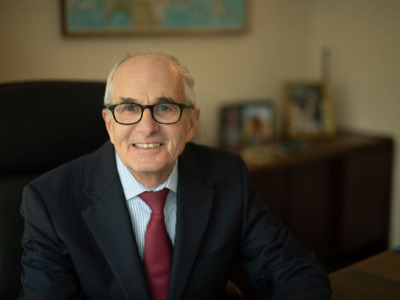In a surprise upset, Dr. Akinwumi (Akin) Adesina was elected to be the next President of the African Development Bank (ADB), defeating seven rivals in six rounds of voting. Adesina holds a PhD in agriculture economics from Purdue and has been serving as the Minister of Agriculture in Nigeria since 2011.
Adesina is the first agriculture economist to become President of the ADB. He is a dynamic leader with a passion for rural development (and bow-ties). According to The Guardian, under his leadership in Nigeria, “food production increased by 22 million tons and food imports dropped more than a third,” creating some three million jobs.
The ADB is one of Africa’s largest lending institutions, making Adesina one of the continents most prominent financial leaders. Africa now has six of the world’s fastest growing economies and, as agriculture becomes more efficient, the economy will grow even faster. Over 65% of the population farms or are engaged in agriculture. However, yields are so low that feeding the family takes 70% the family’s disposable income and Africa must spend $35 billion to import food.
Adesina’s goal is to make Africa globally competitive. Upon his election he said: “A big thing for us in Africa is to create an inclusive model with jobs for Africa’s youth, jobs for Africa’s women, revive Africa’s rural areas and have regional integration for shared prosperity.” He also noted that “there is no developing Africa without empowering women.”
The challenge Adesina faces will not be easy. Political stability varies widely in Africa’s 54 sovereign nations as does infrastructure, education and health care, but things are clearly changing and changing fast.
Adesina will have some important allies to work with in his new capacity---
· The Chairperson of the African Union, Dr. Nikosazana Diamini- Zuma, is asking all African countries to invest at least 10% of their respective national budgets in agriculture. The program, called CAADP is having an impact.
· Dr. Agnes Kalibata, the new President of the Alliance for a Green Revolution in Africa, AGRA, holds a doctorate from the University of Massachusetts in entomology. She was the Minister of Agriculture in Rwanda and was widely considered to be one of the most successful agriculture ministers in sub-Saharan Africa. At AGRA, Kalibata is working with African experts in some 18 counties to fulfill the vision of food self-sufficiency.
· Strive Masiyiwa, the Chairman and CEO of Econet Wireless is the “Bill Gates of Africa” according to Forbes, but is focusing the attention of Africa’s private sector on agriculture through his work with AGRA and Grow Africa.
· Former United Nations Secretary General Kofi Annan served as Chairman of the Board of AGRA. He is now Chairman Emeritus and Chairs the Kofi Annan Foundation too. He has been a giant in the fight for African food security.
These African leaders are working closely with the G7, G20 and key leaders closer to home here is the United States. Those leaders include: Gayle Smith, who is an Assistant to President Barack Obama and Senior Director at the National Security Council. In that capacity, Smith is responsible for global development and helped to craft the Camp David Accords creating a commitment to African agriculture.
During the Clinton Administration, Smith was Senior Director for African Affairs at the National Security Council. President Obama has now nominated Smith to be the next Director of the Agency for International Development (AID). Smith is well-qualified for the AID position and hopefully, the U.S. Senate will quickly confirm her nomination.
While there are many others committed to growing Africa out of poverty, in the U.S., special recognition must also go to Pamela Anderson at the Bill and Melinda Gates Foundation and Judith Rodin at the Rockefeller Foundation.
All of these people are coming together for Africa. The Renaissance is under way and the election of Dr. Akin Adesina is the latest very important development. According to Adesina “The kind of Africa we need today is an Africa where the young people want to stay, not a place they want to move away from…..and an Africa we can all be proud to call home.”
As Adesina knows, agriculture development must be at the center of the African Renaissance. As modern seeds and inputs, along with education, reaches the stallholder farmers, production and profitability will improve. That will drive the Africa economy to new levels of success and, in the process, move Africa and the world toward food security.
The African Development Bank made an inspired choice.
Marshall Matz specializes in agriculture and food security at OFW Law in Washington, D.C. He also serves as the DC representative for the Alliance for a Green Revolution in Africa.

